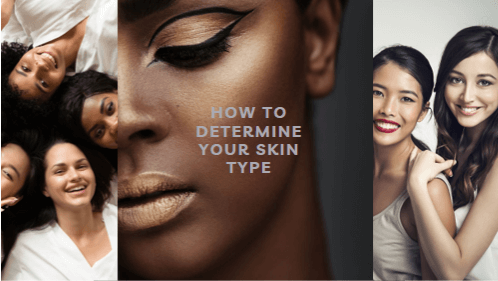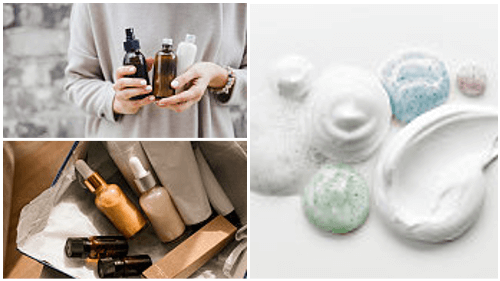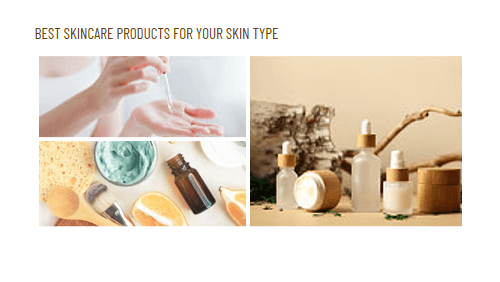Your skin is the largest organ of your body, and it deserves the best care possible. However, not all skincare products are created equal. Depending on your skin type, some products may work better for you than others. That’s why it’s important to know your skin type and choose the best skincare products for it.
There are five common skin types: normal, dry, oily Skin, combination, and sensitive.
Each skin type has its own characteristics and challenges, and requires a different approach to skincare. In this article, we will help you determine your skin type, and give you some tips on how to choose the best skincare products for it.
How to Determine Your Skin Type

The first step to finding the best skincare products for your skin type is to know what your skin type is. Here are some general descriptions of each skin type, and some simple ways to test your skin type at home.
Normal skin:
Normal skin is well-balanced, neither too dry nor too oily. It has a smooth texture, fine pores, and an even tone. Normal skin is not prone to breakouts, irritation, or sensitivity. To test if you have normal skin, wash your face with a gentle cleanser and pat it dry.
Wait for an hour, and then examine your skin in a mirror. If your skin feels comfortable, looks healthy, and does not have any shine or flakiness, you have normal skin.
Dry skin:
Dry skin is lacking in moisture and oil. It has a rough texture, small pores, and a dull tone. Dry skin is prone to flaking, cracking, itching, and redness. To test if you have dry skin, wash your face with a gentle cleanser and pat it dry.
Wait for an hour, and then examine your skin in a mirror. If your skin feels tight, looks dull, and has visible flakes or cracks, you have dry skin.
Oily skin:
Oily skin is producing too much oil. It has a shiny texture, large pores, and a greasy tone. Oily skin is prone to clogged pores, blackheads, whiteheads, and acne. To test if you have oily skin, wash your face with a gentle cleanser and pat it dry.
Wait for an hour, and then examine your skin in a mirror. If your skin feels oily, looks shiny, and has visible pores or blemishes, you have oily skin.
Combination skin:
Combination skin is a mix of dry and oily skin. It has a normal or dry texture on the cheeks, and an oily texture on the T-zone (forehead, nose, and chin). Combination skin is prone to both dryness and oiliness, depending on the area of the face. To test if you have combination skin, wash your face with a gentle cleanser and pat it dry.
Wait for an hour, and then examine your skin in a mirror. If your skin feels normal or dry on the cheeks, and oily on the T-zone, you have combination skin.
Sensitive skin:
Sensitive skin is easily irritated by external factors, such as weather, pollution, cosmetics, or skincare products. It has a thin texture, fine pores, and a reddish tone. Sensitive skin is prone to itching, burning, stinging, and inflammation. To test if you have sensitive skin, wash your face with a gentle cleanser and pat it dry.
Wait for an hour, and then examine your skin in a mirror. If your skin feels uncomfortable, looks red, and has signs of irritation, you have sensitive skin.
If you are unsure about your skin type, or have any skin concerns, such as allergies, eczema, rosacea, or acne, it is best to consult a dermatologist. A dermatologist can diagnose your skin type, and prescribe the best skincare products for your skin condition.
How to Choose the Best Skincare Products for Your Skin Type

Once you know your skin type, you can choose the best skincare products for it. The basic steps of a skincare routine are cleansing, toning, moisturizing, and protecting.
However, the key ingredients and formulas of these products may vary depending on your skin type. Here are some general guidelines on how to choose the best skincare products for your skin type.
1) Cleansing
Cleansing is the first step of any skincare routine. It removes dirt, oil, makeup, and impurities from your skin and prepares it for the next steps.
The best cleanser for your skin type should be gentle, effective, and suitable for your skin’s needs.
– Normal skin:
Normal skin can use any type of cleanser, as long as it is gentle and does not strip the skin of its natural moisture.
You can choose from gel, cream, foam, or oil cleansers, depending on your preference.
Some examples of suitable cleansers for normal skin are Cetaphil Gentle Skin Cleanser, Neutrogena Hydro Boost Hydrating Cleansing Gel, and Bioderma Sensibio H2O Micellar Water.
– Dry skin:
Dry skin needs a cleanser that can hydrate and nourish the skin, while removing dirt and impurities.
You should avoid cleansers that contain harsh ingredients, such as alcohol, sulfates, or fragrances, as they can dry out the skin even more.
You should opt for cream, oil, or balm cleansers, as they can moisturize and soften the skin.
Some examples of suitable cleansers for dry skin are CeraVe Hydrating Facial Cleanser, La Roche-Posay Toleriane Hydrating Gentle Cleanser, and Clinique Take The Day Off Cleansing Balm.
– Oily skin:
Oily skin needs a cleanser that can regulate oil production while removing excess oil and impurities.
You should avoid cleansers that are too harsh or too drying, as they can trigger more oil production and cause irritation.
You should opt for gel, foam, or clay cleansers, as they can cleanse and mattify the skin.
Some examples of suitable cleansers for oily skin are Cetaphil Oily Skin Cleanser, La Roche-Posay Effaclar Purifying Foaming Gel, and Innisfree Super Volcanic Pore Clay Mask.
– Combination skin:
Combination skin needs a cleanser that can balance the dry and oily areas of the face while removing dirt and impurities.
You should avoid cleansers that are too rich or too stripping, as they can cause dryness or oiliness in different parts of the face.
You should opt for gel, cream, or foam cleansers, depending on the season and your skin’s condition.
Some examples of suitable cleansers for combination skin are CeraVe Foaming Facial Cleanser, Neutrogena Ultra Gentle Hydrating Cleanser, and COSRX Low pH Good Morning Gel Cleanser.
– Sensitive Skin:
Sensitive skin needs a cleanser that can soothe and calm the skin, while removing dirt and impurities.
You should avoid cleansers that contain potential irritants, such as alcohol, sulfates, fragrances, or essential oils, as they can cause inflammation and allergic reactions.
You should opt for gentle, hypoallergenic, and fragrance-free cleansers, such as micellar water, cream, or oil cleansers.
Some examples of suitable cleansers for sensitive skin are Bioderma Sensibio H2O Micellar Water, Aveeno Ultra-Calming Hydrating Gel Cleanser, and Simple Kind to Skin Cleansing Oil.
2) Toning
Toning is the second step of any skincare routine. It corrects the skin’s pH balance, gets rid of any residue that the cleanser left behind, and gets the skin ready for the next step.
The best toner for your skin type should be gentle, hydrating, and suitable for your skin’s needs.
– Normal Skin:
Normal skin can use any type of toner, as long as it is gentle and hydrating.
You can choose from water, gel, or mist toners, depending on your preference.
Some examples of suitable toners for normal skin are Thayers Witch Hazel Alcohol-Free Toner, COSRX Advanced Snail 96 Mucin Power Essence, and Mario Badescu Facial Spray with Aloe, Herbs and Rosewater.
– Dry skin:
Dry skin needs a toner that can hydrate and nourish the skin, while restoring the pH balance. You should avoid toners that contain alcohol, astringents, or witch hazel, as they can dry out the skin even more.
You should opt for hydrating, soothing, or moisturizing toners, such as water, gel, or mist toners.
Some examples of suitable toners for dry skin are Klairs Supple Preparation Unscented Toner, Hada Labo Gokujyun Premium Hyaluronic Acid Lotion, and Laneige Cream Skin Refiner.
Oily skin:
Oily skin needs a toner that can regulate oil production while restoring pH balance.
You should avoid toners that are too harsh or too drying, as they can trigger more oil production and cause irritation.
You should opt for balancing, clarifying, or exfoliating toners, such as water, gel, or acid toners.
Some examples of suitable toners for oily skin are Benton Aloe BHA Skin Toner, The Ordinary Glycolic Acid 7% Toning Solution, and Paula’s Choice Skin Perfecting 2% BHA Liquid Exfoliant.
Combination skin:
Combination skin needs a toner that can balance the dry and oily areas of the face while restoring the pH balance.
You should avoid toners that are too rich or too stripping, as they can cause dryness or oiliness in different parts of the face.
You should opt for gentle, hydrating, or exfoliating toners, depending on the season and your skin’s condition.
Some examples of suitable toners for combination skin are Pyunkang Yul Essence Toner, COSRX AHA/BHA Clarifying Treatment Toner, and Fresh Rose Deep Hydration Facial Toner.
Sensitive skin:
Sensitive skin needs a toner that can soothe and calm the skin while restoring pH balance.
You should avoid toners that contain potential irritants, such as alcohol, astringents, fragrances, or essential oils, as they can cause inflammation and allergic reactions.
You should opt for gentle, hypoallergenic, and fragrance-free toners, such as water, gel, or mist toners.
Some examples of suitable toners for sensitive skin are Etude House Soon Jung pH 5.5 Relief Toner, La Roche-Posay Thermal Spring Water, and Kiehl’s Calendula Herbal Extract Alcohol-Free Toner.
3) Moisturizing
Moisturizing is the third step of any skincare routine. It replenishes the moisture and oil that the skin loses during cleansing and toning and prevents the skin from dehydration and damage.
The best moisturizer for your skin type should be hydrating, nourishing, and suitable for your skin’s needs.
– Normal skin:
Normal skin can use any type of moisturizer, as long as it is hydrating and nourishing.
You can choose from lotion, cream, gel, or oil moisturizers, depending on your preference.
Some examples of suitable moisturizers for normal skin are CeraVe Daily Moisturizing Lotion, Neutrogena Hydro Boost Water Gel, and The Ordinary 100% Plant-Derived Squalane.
– Dry skin:
Dry skin needs a moisturizer that can hydrate and nourish the skin, while repairing the skin barrier.
You should avoid moisturizers that contain alcohol, fragrances, or preservatives, as they can dry out the skin even more.
You should opt for rich, creamy, or oily moisturizers, as they can lock in moisture and protect the skin.
Some examples of suitable moisturizers for dry skin are Cetaphil Moisturizing Cream, La Roche-Posay Lipikar Balm AP+ Intense Repair Moisturizing Cream, and Weleda Skin Food Original Ultra-Rich Cream.
– Oily skin:
Oily skin needs a moisturizer that can hydrate and regulate the skin, while preventing clogged pores and breakouts.
You should avoid moisturizers that are too heavy or greasy, as they can worsen the oiliness and cause acne.
You should opt for light, oil-free, or mattifying moisturizers, as they can moisturize and balance the skin.
Some examples of suitable moisturizers for oily skin are Cetaphil PRO Oil Absorbing Moisturizer SPF 30, The Ordinary Natural Moisturizing Factors + HA, and La Roche-Posay Effaclar Mat Oil-Free Mattifying Moisturizer.
– Combination skin:
Combination skin needs a moisturizer that can hydrate and balance the skin while addressing the different needs of the dry and oily areas.
You should avoid moisturizers that are too rich or too light, as they can cause dryness or oiliness in different parts of the face.
You should opt for lotion, gel, or cream moisturizers, depending on the season and your skin’s condition.
Some examples of suitable moisturizers for combination skin are CeraVe PM Facial Moisturizing Lotion, Neutrogena Hydro Boost Gel-Cream, and Belif The True Cream Aqua Bomb.
– Sensitive skin:
Sensitive skin needs a moisturizer that can hydrate and calm the skin, while strengthening the skin barrier.
You should avoid moisturizers that contain potential irritants, such as alcohol, fragrances, or essential oils, as they can cause inflammation and allergic reactions.
You should opt for gentle, hypoallergenic, and fragrance-free moisturizers, such as lotion, cream, or gel moisturizers.
Some examples of suitable moisturizers for sensitive skin are Aveeno Ultra-Calming Daily Moisturizer SPF 15, La Roche-Posay Toleriane Double Repair Face Moisturizer, and Dr. Jart+ Cicapair Tiger Grass Cream.
4) Protecting
Protecting is the last step of any skincare routine. It shields the skin from the harmful effects of the sun, such as UV rays, free radicals, and premature aging.
The best sunscreen for your skin type should be broad-spectrum, SPF 30 or higher, and suitable for your skin’s needs.
– Normal skin:
Normal skin can use any type of sunscreen, as long as it is broad-spectrum, SPF 30 or higher, and moisturizing.
You can choose from chemical, physical, or hybrid sunscreens, depending on your preference.
Some examples of suitable sunscreens for normal skin are Neutrogena Ultra Sheer Dry-Touch Sunscreen SPF 55, EltaMD UV Clear Broad-Spectrum SPF 46, and Supergoop! Unseen Sunscreen SPF 40.
– Dry skin:
Dry skin needs a sunscreen that can protect and moisturize the skin, while preventing dehydration and damage.
You should avoid sunscreens that contain alcohol, fragrances, or preservatives, as they can dry out the skin even more.
You should opt for creamy, hydrating, or moisturizing sunscreens, such as physical or hybrid sunscreens.
Some examples of suitable sunscreens for dry skin are CeraVe Hydrating Sunscreen SPF 50, La Roche-Posay Anthelios Melt-In Sunscreen Milk SPF 60, and Purito Centella Green Level Unscented Sun SPF 50+.
– Oily skin:
Oily skin needs a sunscreen that can protect and regulate the skin, while preventing shine and breakouts.
You should avoid sunscreens that are too heavy or greasy, as they can worsen the oiliness and cause acne.
You should opt for light, oil-free, or mattifying sunscreens, such as chemical or hybrid sunscreens.
Some examples of suitable sunscreens for oily skin are Cetaphil PRO Oil Control Moisturizer SPF 30, Biore UV Aqua Rich Watery Essence SPF 50+, and La Roche-Posay Anthelios Clear Skin Dry Touch Sunscreen SPF 60.
– Combination skin:
Combination skin needs a sunscreen that can protect and balance the skin, while addressing the different needs of the dry and oily areas.
You should avoid sunscreens that are too rich or too light, as they can cause dryness or oiliness in different parts of the face.
You should opt for lotion, gel, or cream sunscreens, depending on the season and your skin’s condition.
Some examples of suitable sunscreens for combination skin are CeraVe AM Facial Moisturizing Lotion SPF 30, Neutrogena Hydro Boost Water Gel Lotion SPF 50, and COSRX Aloe Soothing Sun Cream SPF 50+.
– Sensitive skin:
Sensitive skin needs a sunscreen that can protect and calm the skin, while avoiding irritation and allergic reactions.
You should avoid sunscreens that contain potential irritants, such as alcohol, fragrances, or essential oils, as they can cause inflammation and allergic reactions.
You should opt for gentle, hypoallergenic, and fragrance-free sunscreens, such as physical or mineral sunscreens.
Some examples of suitable sunscreens for sensitive skin are Aveeno Sensitive Skin Mineral Sunscreen SPF 50, La Roche-Posay Anthelios Mineral Sunscreen Gentle Lotion SPF 50, and Drunk Elephant Umbra Sheer Physical Daily Defense SPF 30.
Conclusion
Choosing the best skincare products for your skin type is not as hard as it may seem. By knowing your skin type, and following the basic steps of a skincare routine, you can find the best skincare products for your skin type, and achieve healthy, glowing, and beautiful skin. Remember to always patch test any new product before using it, and to adjust your skincare routine according to the changes in your skin, weather, or lifestyle. We hope this article has helped you find the best skincare products for your skin type, and we Would love to hear your feedback and results. Happy skincare!
Disclaimer:
The information provided in this article is for general informational purposes only and does not constitute professional or medical advice. The author is not a licensed dermatologist, physician, or skincare expert. The products and brands mentioned in this article are based on the author’s personal experience and opinion, and are not endorsed or sponsored by any of them. The author does not guarantee the accuracy, completeness, or suitability of the information in this article, and is not liable for any errors, omissions, or damages arising from its use or reliance. The readers are advised to consult a qualified dermatologist or physician before using any skincare products or following any skincare tips mentioned in this article.
· How to Use Rice Water For Skincare Routine
· How to Build Best Skincare Routine
· Embrace Winter Beauty With the Best Cold Pressed Coconut Oil: Top 5 Picks
· How to Have Smooth Skin Naturally at Home
